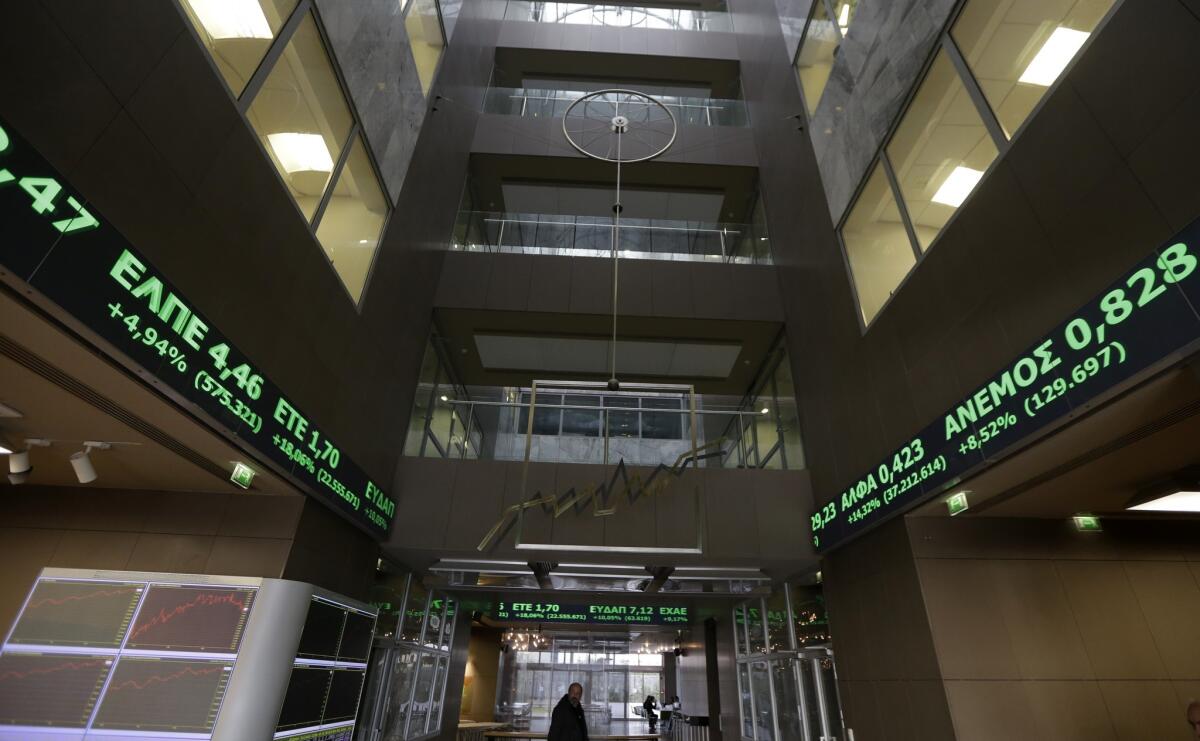European creditors endorse Greek reform plans as leftists object

- Share via
Reporting from Athens — Greece’s creditors agreed Tuesday to accept its list of promised reforms and belt-tightening in exchange for a four-month extension of its bailout program in a move that should keep funds flowing to the cash-strapped country.
But the measures presented by the new leftist government in Athens have been promised before and unfulfilled as Greeks have revolted against the harsh austerity measures imposed in exchange for the bailout over the last five years.
The renewed commitments made to lenders Tuesday also represented a retreat from the anti-austerity message of Prime Minister Alexis Tsipras and his populist Syriza party on the campaign trail, threatening a fresh bout of internal discord just a month into the new government’s four-year term.
The reforms, aimed mainly at curbing tax evasion and corruption and overhauling the country’s costly civil service, were a key condition to a tentative agreement Athens and its international lenders struck last week as the expiration of the current bailout program expires on Saturday.
Finance ministers from the 19 countries sharing the single European currency reviewed the Greek government’s planned economies and reforms and billed the list “sufficiently comprehensive” and a “valid starting point for a successful conclusion of the review.”
The plan also secured endorsement by the troika of lending institutions that oversee the Greek bailout program: the European Commission, the European Central Bank and the International Monetary Fund.
“The three institutions agreed to start the process with this. They thought it was a serious enough list and all the countries have just agreed with that in the meeting so we can start,” Eurozone finance chief Jeroen Dijsselbloem told Germany’s RTL television.
The creditors made clear, though, that Greece will need to step up the pace of its budget streamlining. They called on the Athens government to “further develop and broaden” its plan to cut costs and raise revenue in line with the repayment terms of its $280-billion bailout, provided since 2010.
European markets reacted favorably to word that the Greek leadership has apparently satisfied its creditors enough to avert a cutoff of the loans needed to keep the economy afloat and the Eurozone intact. Greek stocks rose almost 10% on the news.
The renewed commitment to austerity, though, represented a climbdown from Syriza’s threat to scrap the bailout agreement unless it got a significant reduction in its obligations and the latitude to invest in new jobs in a country with 27% unemployment.
A senior Greek finance official, briefing reporters on condition of anonymity, sought to present the renewed bailout commitments as a compromise with creditors, who he said had been demanding “a grab bag of requests” for deeper spending cuts, the majority of which Athens’ negotiators succeeded in defeating.
“Ultimately, the agreement is a two-way moratorium or swap whereby we refrain from taking any sort of unilateral action that could derail the budget in exchange for an end to continued austerity ordered by lenders,” the official said.
He denied that the government had departed from its campaign promises to boost jobs and wages.
“When Alexis Tsipras made his policy statements, he was speaking in terms of a four-year term, not about the next month,” the official said of Syriza’s platform.
But in satisfying lenders, critics say, and staving off a chaotic default within weeks, Tsipras and his radical leftist government abandoned their objection to privatizations and their promises of wage hikes and tax relief -- the anti-austerity message that rallied Greeks to vote for the radical leftist Syriza party in snap parliamentary elections last month.
Already, several prominent Syriza members are calling on Tsipras to honor his campaign pledges.
“It’s difficult to determine how the government can fulfill its promises, including a write-off of the country’s debt,” said Costas Lapavitsas, a prominent economics professor recently elected to parliament on the Syriza ticket. “It is imperative for the government to explain how it plans to do just that under the current agreement.”
Even renowned composer Mikis Theodorakis waded into the brewing revolt, meeting with Tsipras Tuesday to try to persuade him to resist the pressure for concessions that would, he said, submit the country to the creditors’ “fatal embrace.”
“Syriza leaders,” he said, “have to find the strength, even now, to say ‘nein’ to Germany.”
More than 40 lawmakers of the ruling party were said to be drafting a petition for an urgent meeting of Syriza’s central committee. Although no one has openly requested Tsipras’ resignation, swelling dissent within the ruling party could complicate the government’s bid to carry out the proposed measures, which require swift approval by the country’s 300-seat parliament.
Government officials insist that immediate priority would be given to settling overdue debts racked up by millions of Greeks as government jobs were slashed and the economy suffered a 25% contraction since 2009.
“This is just the start of a process of negotiations,” said government spokesman Gabriel Sakellaridis. “We don’t have a magic wand to repair all that has been done wrong in just a matter of three weeks that we have been in power.”
Special correspondent Carassava reported from Athens and staff writer Williams from Los Angeles
Follow @cjwilliamslat for the latest international news 24/7
More to Read
Sign up for Essential California
The most important California stories and recommendations in your inbox every morning.
You may occasionally receive promotional content from the Los Angeles Times.










